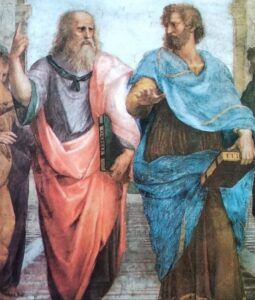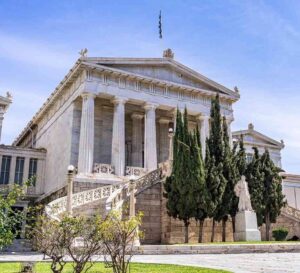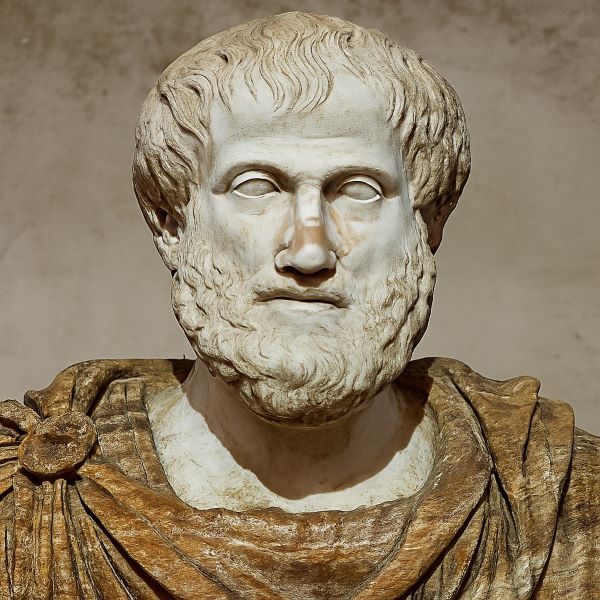Aristotle
How did it all begin?
Antiquity is a historical period spanning the period from the invention of writing to the fall of the Roman Empire. This is the period in which the first states emerged, civilizations developed, and the foundations of modern culture, science, and art were laid.
Antiquity was a time of key changes that shaped the world we know today. The introduction of writing, the development of cities, the creation of legal systems, religion, and art were the underpinnings for later eras. One of the most famous creators of this era is Aristotle.

Aristotle's Profile
Aristotle was one of the three most famous philosophers of ancient Greece, along with Socrates and Plato. He was born in the 4th century BC. He is called a Stagirite – the name comes from the town where he was born. He was the creator of a philosophical system called Aristotelianism. He had a huge influence on the development of logic and natural sciences.
Teacher's pet became the teacher
At the age of 18, he moved to Athens and joined the Platonic Academy. He was a student of Plato, but did not always agree with his opinions. He spent 20 years at the Academy, then he became a lecturer. After Plato’s death, he settled in Assos and continued his activity. He returned to Athens and founded his own school, in the gardens of the Lyceum – this is where the name for the Polish highschool “liceum” comes from. He took care of a more comprehensive approach to research, both in the humanities and natural sciences.

The teacher of the royals
He taught the son of Philip II until Alexander the Great took power in the state. During his work as a teacher, Aristotle had a huge influence on Alexander’s intellectual, moral and political growth. Aristotle’s teachings enabled Alexander the Great to acquire the knowledge he needed, but also to develop the necessary qualities. As a result, he became an outstanding leader, ruler and conqueror.
The last words
After the death of Alexander the Great, fearing for his safety, Aristotle left Athens, saying goodbye with the words: “I will not allow the Athenians to sin against philosophy twice,” which was a reference to the character of Socrates, who was sentenced to death by drinking poison by the inhabitants of the city for allegedly inciting the Athenian youth. He settled in Chalcis on Euboea – it was there that he died at the age of 62.

Versatile opinions
Sacred Aurea Mediocritas
Aristotle is the creator of the theory of the golden mean. It recommended moderation in all behavior.
Recipe For Happiness
According to Aristotle, the highest good and goal was happiness. His belief assumed that gaining happiness is possible by developing an essential feature, which is reason. Through this ability, man can learn and shape his life.
Philosopher's Ethos
The Greek thinker’s theory also touched on issues related to morality and ethics. In his opinion, a person should direct their life in accordance with certain virtues. They can be interpreted as a willingness to undertake actions in accordance with reason, which choose the golden mean between extreme possibilities.
Physicist, Chemist, Mathematician...
Aristotle also claimed that every substance consists of matter and form, where matter fills space, and form is responsible for shaping individual parts of matter. Through this, he explained the changes taking place in the world and the development of living beings and metaphysical concepts.
Aristotle's Exegi monumentum
The works of Aristotle and his collaborators from the Lyceum were divided into two groups. Some were intended for a wide audience, others only for the chosen ones. The collection of Aristotle’s writings that have survived to this day is called Corpus Aristotelicum.
Rhetoric, On Interpretation, First Analytics, Physics, On Heaven are only examples of Aristotle’s vast work.
Aristotle's Golden Thoughts
Aristotle is also known for his maxims, which are still relevant today.






Why is Aristotle a Renaissance man?
Aristotle can be called a Renaissance man because he was multi-talented and educated. He had great achievements in such fields of science as rhetoric, logic and philosophy. Although many of his ideas, as it turned out later, were wrong, they contributed to development and progress because they became the beginning of further considerations by other thinkers.
Made by group 2
– Katarzyna Szczepanik
– Julia Chapkailo
– Natalia Frankowska
– Patrycja Kantarska
– Małgorzata Fortuna
– Damian Bąba

